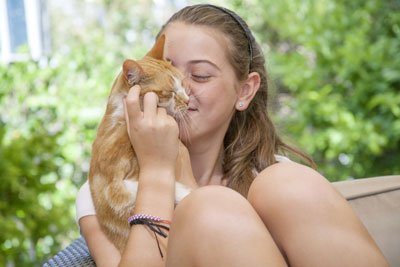Cats are just as bonded as dogs to their owners, study says

Cats are often described as aloof, ambivalent and antisocial, but researchers at Oregon State University’s Human-Animal Interaction Lab beg to differ. Results of their new study, published in Current Biology, show that cats display distinct attachment behaviors toward their owners.
In their study summary, the authors contend that “despite fewer studies, research suggests we may be underestimating cats’ socio-cognitive abilities.”
Using behavioral criteria applied in the human and canine attachment literature, investigators in the current study set out to determine whether pet cats display distinct attachment styles toward their human caregivers. In the study, 79 kittens (age 3 to 8 months) and 38 adult cats and their owners completed a secure base test, in which the cat and caregiver were placed alone in an unfamiliar room for two minutes, then the owner left the cat alone in the room for two minutes and, finally, the owner returned to the room.
Investigators observed the cats’ attachment level during this final stage—the owner’s return—and categorized it either as secure, in which the cat continued to explore the room calmly when the owner returned, or insecure, with the cat demonstrating anxiety when the owner returned. This anxiety was manifested by avoiding the caregiver, acting ambivalent toward the caregiver, or a combination of the two.
Of the 70 classifiable kittens (nine were considered unclassifiable), 64.3% were categorized as securely attached and 35.7% as insecurely attached. Similarly, 65.8% of the adult cats were classified as having a secure attachment and 34.2% an insecure attachment. These findings are well in line with those in canine and human studies, the investigators noted—65% of human infants form secure attachments to their caregivers, and 58% of dogs form secure attachments.
The investigators retested about half of the kittens after six weeks of training and socialization, and found that those activities had no measurable effect on attachment level.
This study’s findings demonstrate that, like dogs, the majority of cats view their owners as a source of comfort and security. Lead study investigator Kristyn Vitale, PhD, told dvm360 that she was not surprised by the findings.
“We see in other species, such as dogs and human infants, that the majority of individuals are securely attached to their caregiver, so it is not shocking the same is true in cats,” Dr. Vitale says.
And the findings are useful for both cat owners and veterinary practices, she says.
“The formation of strong bonds between cats and humans can have positive impact on cat behavior and welfare,” Dr. Vitale says. “The more we know about the cat-human bond, the more strategies we can propose to deal with feline behavioral issues in the home or address medical issues related to separation distress.”
By Maureen McKinney, Associate Editorial Director. DVM360- Behavior (11)
- Caring for your pet (263)
- cat (4)
- Community Events (19)
- dog (6)
- From Our Clients (15)
- Happy Tails (8)
- News (418)
- Press (53)
- Products (2)
- Questions (4)
- Recalls (1)
- Special Offers (5)
- Tips & Advice (231)
- Uncategorized (19)
- Veterinary Services (48)
